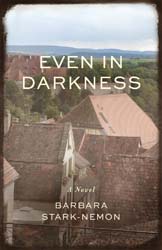Join a community of readers who are committed to Jewish stories
Sign up for JBC’s Nu Reads, a curated selection of Jewish books delivered straight to your door!
Earlier this week, Barbara Stark-Nemon wrote about writing visual arts into literature and how her family chose to remember Germany after World War II. She is the author of the recently published novel Even in Darkness. She has been blogging here all week for Jewish Book Council’s Visiting Scribe series.
 Let’s talk about book clubs. I belong to two. I became part of the first one at the invitation of a neighbor, who is not only one of the best readers I know, but happily, one of the best people I know. He told me this book club had been in existence for many years and consisted of a core group of men and women with occasional temporary members.
Let’s talk about book clubs. I belong to two. I became part of the first one at the invitation of a neighbor, who is not only one of the best readers I know, but happily, one of the best people I know. He told me this book club had been in existence for many years and consisted of a core group of men and women with occasional temporary members.
Book selections for the club are limited to novels that have already come out in paperback. There is no moderator. This group consists largely of lawyers whose politics lean left. Two of the dozen members are practicing Jews. These lawyers read books. Lots of books. After joining the group, I realized that I would be reading many books that I would never read on my own. I liked some, didn’t like others, or had mixed feelings. The books were drawn heavily from Booker Prize lists, NY Times reviews, and referrals from other readers.
As I was beginning to shift my own career toward full-time writing, I thought it was important to read outside my comfort zone, which I’d happily inhabited with authors of literary fiction and the occasional historical novel. Enter, sharp edgy humorists, pessimistic political commentators, cross-cultural and international observers, regional writers, and mythmakers. Often a member researched a book’s historical and literary context, and reported to the group. The conversation was always engaging.
The occasional hard work of finishing well-written books I didn’t much like, and then defending my judgments, was and is good work, but I yearned to read and discuss more of the books I enjoy most. So five years ago, I joined a second book club.
This group consists exclusively of professional Jewish women, perhaps half of whom are lawyers. (What is it with me and book-crazy lawyers?) I almost always enjoy reading their selected books — heavy on the literary fiction, mostly contemporary, but sometimes historical. One person is assigned responsibility for presenting background about the book at each meeting, and then moderating the discussion. It’s a more formal structure than the other group’s, but seems to result in an equally lively interaction. There is more consensus among group members, but also more exploration of characters and thematic elements of books discussed.
One week, my original book club discussed a recent best-selling historical novel by a well-known author. The discussion was spirited, with half the members (including all the men) insisting the book was less engaging than promised, and too drawn out with clichéd characters. The charge of “classic women’s fiction” was leveled. A vocal minority argued that the book was engaging, well written, and deftly descriptive of the racial, gender and political limitations from which the characters had to break free.
In a revelatory summation, the book’s harshest critic asserted that he wanted the club to read books he wouldn’t read on his own, perhaps because they were too long, too challenging or unlikely to immediately draw him. Yet he still wanted them to be substantive and complex enough to occasion good discussion. He wanted the books to discomfit him and to teach him. He thought that evening’s book was too simple to meet these criteria. I disagreed, but was fascinated at how different his perspective was from mine.
The very same month, my all-women’s book club read the same book, and thought it was a fine conversion of real historical characters and events into an instructive, well-written, and engaging novel. The group derived inspiration from reading about the characters’ resilience, endurance, and victory over violence, intolerance, and physical and spiritual suffering. This was a timely lesson for me as an author – the same book, very different reactions. It helped me remember that readers come to the book for all different reasons, a good notion to keep in mind on the eve of a book release.
And, it’s why I’m in two book clubs.
Every story needs a narrator, and Barbara Stark-Nemon stepped up early in life. She learned a fascination with the magic of language from her storytelling grandfather. An undergraduate degree in English literature and art history and a master’s degree in speech-language pathology from the University of Michigan led Stark-Nemon to a career in schools, universities, and hospitals. As a teacher and speech-language therapist, Barbara specialized in child language disorder and deafness; everywhere, there were stories, and the need to be heard and seen that we all share. Today Stark-Nemon writes novels and family histories while gardening, cycling, and creating fiber art in Ann Arbor and Northport, Michigan.
Related Content: